-
About
First-Year Application Deadline
Don't miss your chance to apply to Marist and join the Red Fox Family!
• Early Decision II and Regular Decision: Sunday, Feb. 15About
-
Academics
First-Year Application Deadline
Don't miss your chance to apply to Marist and join the Red Fox Family!
• Early Decision II and Regular Decision: Sunday, Feb. 15Academics
-
Admission & Financial Aid
First-Year Application Deadline
Don't miss your chance to apply to Marist and join the Red Fox Family!
• Early Decision II and Regular Decision: Sunday, Feb. 15Admission & Financial Aid
-
Student Life
First-Year Application Deadline
Don't miss your chance to apply to Marist and join the Red Fox Family!
• Early Decision II and Regular Decision: Sunday, Feb. 15Student Life
- Athletics
A man working in front of the computer
School of Management
Archived Newsletters
New accounting masters program now available
In late June, the New York State Education Department approved the School of Management’s new Master of Science in Professional Accountancy (MS/PAccy) program.
This innovative, 30-credit graduate program allows students to simultaneously earn a master’s degree and satisfy the 150 semester hours they need to become licensed as certified public accountants. Students will complete the program’s 10 required courses through a combination of both online and in-class sessions, a number of which will be held during the summer months.
“The Marist Master of Science in Professional Accountancy provides an opportunity to strengthen foundational accounting knowledge in a timely and flexible manner and encourages students starting out in the accounting profession to seriously consider this quality program,” says Stephen J. Cosgrove, chair of the Dean’s Board of Advisers.
The new program has two features that should attract potential candidates, says Dean Lawrence Singleton. “Students will have the ability to complete the program in a short period of time. Marist undergraduate accounting students who are admitted to the program in their junior year can earn both the B.S. in accounting and the M.S. in professional accountancy in as little as four years and four months.” In addition, Singleton says, the program gives students “the opportunity to enjoy an accounting internship during the traditionally busy winter season, when they can get the best possible public accounting experience.”
The MS/PAccy program was developed — and shepherded through the state approval process — by Prof. J. Donald Warren, Jr., Schlobach Distinguished Chair in Accounting and the director of the program. Having retired from a Big-Four accounting firm, Warren has extensive experience in addressing the attributes for success in an accounting career. With the adoption of the 150-hour CPA licensing requirement, he notes, “the game has changed. For students entering the accounting profession or the corporate world, a graduate degree is more advantageous than an additional 30 semester hours in undergraduate studies. Many of their peers (and competitors for positions and promotions) from other colleges will have completed a five-year, 150-hour program that awards them a graduate degree in accounting.”
Assisting Warren with the program development process were Associate Dean for Academic Affairs Kate Donham, SoM Director of Undergraduate Advising and Student Services Jean Theobald, and SoM Director of Executive Programs Jay Pantaleo. Professors Ken Coletti, Phil LaRocco and Greg Tully provided information necessary to prepare the program’s proposal.
Financial Gains
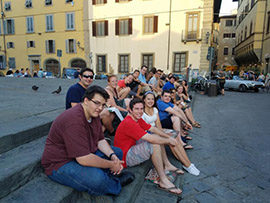
Now in its second year, the program “allows students who might not otherwise have room in their schedules the opportunity to travel overseas,” says Haughey. “And, as the ‘accelerated’ in the name alludes to, finance students potentially can complete their emphasis in their sophomore year, thereby allowing them to take advanced finance electives in their junior and senior years.”
Stephanie Secor ’20, one of this year’s ASPIRE participants, had high praise for the program. “It provided the opportunity to meet new people and explore different cultures while furthering our education,” she says. “And it allowed many of us who are unable to spend an entire semester away from campus to still have a memorable abroad experience.”
Faculty Focus
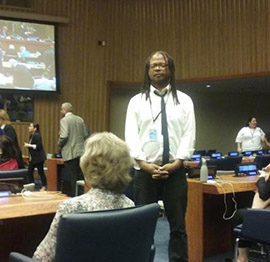
“A Seat at the Table” is the title of Prof. Tia Sheree Gaynor’s interview on No Jargon, a weekly online podcast series hosted by the Scholar’s Strategy Network. Gaynor discusses her research into the gap between local government decision-making and the residents who are most affected by those decisions. (View the podcast here.)
Dean Lawrence Singleton has been elected to the Beta Gamma Sigma Board of Governors. Founded in 1907, this international honor society is the premiere honor society recognizing business excellence, and is often described as the “Phi Beta Kappa of business.” Along with his election, Dean Singleton was selected to chair the 16-member board’s audit committee.
IN THE PHOTO: Prof. Vernon Murray at the U.N.
Alumni Profile: The Rev. Maryann Berry ’75

Along with Wayne, her husband of 42 years, Maryann is co-pastor of John 3:16 Christian Center in nearby Union Vale, NY. Her adult children, Maria and John — along with their spouses, Michael and Jessica — are all ministers in the 300-member church. Maryann also develops coursework and teaches at the center’s accredited bible college, which offers a bachelor’s degree in Christian theology.
Berry’s journey from B-school graduate to cleric was a circuitous one. Born in Brooklyn, she spent her teens in Poughkeepsie. She enrolled at Marist and spent two years studying French; a love of music took her to Manhattanville College in Westchester for one year. Eventually she returned to Marist where she completed her B.S. in business administration. All parts of this disparate educational path have come in handy, Berry says: “I lead the music at the church, I do the accounting, and the language study helps me with the sermons.”
Originally a member of the Catholic faith, Berry says she was called to the ministry after suffering through an 18-month illness that her doctors couldn’t remedy. “I went to a prayer meeting with my mother at an Episcopal church,” she remembers. “I sat by the exit door. I thought they were all crazy people.” But the experience had a lasting impact: Berry turned to prayer, and her illness abated. “Something happened to me,” she says. “We knew that something was changing, that God was calling us into the ministry.” Berry described this experience in her first book, “Answered Prayer.”
Earlier this year, Berry published “Why Are You Sleeping: A Spiritual Look at End Times.” The book, she says, “deals with prophecies of the end of times, and where the church stands. It tries to answer questions — is Jesus going to return? Is Christianity the only road to truth? Will there be an antichrist? — from a biblical perspective.” (Visit her website for ordering information.)
Berry credits her time at Marist with cementing her love for studies. And being “the only woman in the marketing class helped me develop confidence. What I learned gave me an incredible foundation of who I am today.”
Getting to know… Joanne H. Gavin
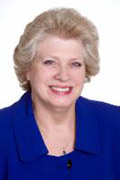
The New Orleans native is one of three Gavins currently offering instruction at the college: Husband David (also from the Big Easy) is an associate professor of management, and their daughter Dana is an adjunct instructor in the English department and works in the college’s writing center. Joanne and David now make their home in nearby Hyde Park.
Joanne earned both her BA and MBA at the University of New Orleans, after which she established a career in hospital administration/healthcare. “My last job, staffing rehab centers for a national firm, got outsourced,” she says. “I wound up going back to school to earn my Ph.D. [at the University of Texas at Arlington]. My degree is in organizational behavior, which is the application of psychology to the workplace. I had worked for some really, really bad bosses; I figured I could make an impact by helping to educate better managers.”
Gavin entered the academic job market in August 2001. At that time, “there were more jobs than people,” she says. “Then 9/11 happened. State-funded schools pulled their open positions off the market, and only small, privately funded colleges were hiring.” After interviewing at Marist, the Air Force Academy and Le Moyne College in Syracuse, Gavin chose to relocate to Poughkeepsie.
“We really wanted to go home to New Orleans, but we decided we’d come east for a short while, just until thing settled down,” she says. “Then Hurricane Katrina hit… Life happens. We miss home and our families, but we love it here.”
Along with her classroom duties, Gavin is “totally focused” on her responsibilities as associate dean of undergraduate programs, a position Dean Singleton asked her to assume four years ago. “There are three primary things I deal with: the New York City Career Trek; the SoM Ambassadors; and the undergraduate program review committee, which handles all academic issues.” She also serves as the faculty adviser for the Ethics Team and as the academic mentor of the men’s tennis team.
Gavin has just returned from a sabbatical, during which she, husband David, and UT professor James Campbell Quick wrote a book for the American Psychological Association. “It’s about how to create safe college campuses under Title IX in order to protect women from sexual assault,” she explains. “I spent a year reading about women being abused at every level. It was depressing, but I felt it was really important and that doing it right mattered.”
While New Orleans may be long plane ride away, Gavin is thrilled to be part of this college community. “Marist is a great combination of student involvement and academic rigor. Not that we’re unique, but you don’t find that everywhere. It keeps the faculty crazy busy, but for me it’s what makes Marist so wonderful.”
Groups of Distinction
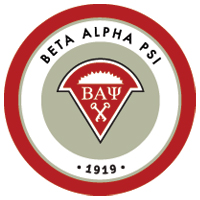
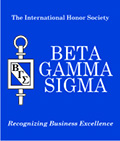
“These recognitions are a public acknowledgement of the consistent and ongoing academic efforts made by both our students and the faculty,” said Dean Lawrence Singleton. “And we couldn’t be prouder of their achievements.”
Faculty Focus
“Fraud Examination,” a new three-credit course being taught by Prof. Kenneth Coletti, launched this fall. Developed in association with the Association of Certified Fraud Examiners, the course examines the history of fraud and its various manifestations, as well as how it can be detected, controlled and prevented. Coletti himself is a licensed Certified Fraud Examiner.
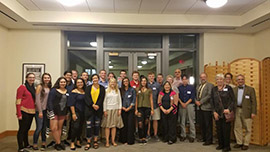
On September 28, School of Management faculty members sat down to dinner with a group of the college’s newest students as part of the First Year Programs Faculty Supper Series. The annual repast took place in the private dining room in the Student Center. Faculty members in attendance included professors John Finnigan, David Gavin, Joanne Gavin, Brian Haughey, Byunghoon Jin, Philip LaRocco, Bonnie Stivers, Della Lee Sue, Melinda Weisberg, Mary Winby and Robert Zito.
Alumni Profile – James E. Daly ’72
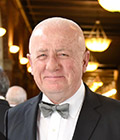
Born in New York City, Daly grew up on Long Island. After completing his short teaching career in Texas, he remained in the educational arena, working as director of admissions at Mount Saint Mary College before assuming the same role in Poughkeepsie. “The school was in a dark financial place when I got here,” he recalls. “But we were able to quintuple the applicant pool and double the enrollment. This helped to put the school on a better financial footing.”
In 1987, Daly switched gears, accepting a position at the venerable firm of Alex. Brown & Sons, the first investment bank established in the U.S. “I was thrilled to join them,” Daly recalls. “I was in my mid-thirties, with two preschool children. I knew that if I wanted to make a career change, it was now or never.” With the company for 12 years, Daly rose to the position of vice president; he then moved to Morgan Stanley Smith Barney, where he served as a vice president for eight years. Since 2011, he has been employed as a financial adviser with Stifel, Nicolaus & Company in Poughkeepsie.
Because of his long association with the college, Daly feels his role as a Board of Advisers member is somewhat unique: “I was dean of admissions for 10 years, and just celebrated my 45th reunion. I know a broad swath of alumni, I have a sort of ‘institutional memory’ of the school, and I’m in the financial industry. I think I bring some things to the plate.”
And speaking of that reunion: On October 7, during Homecoming and Reunion Weekend, Daly received the Dr. Dennis J. Murray Distinguished Service Award from the Alumni Association. He insists, however, that “Marist has done so much more for me than I’ve done for Marist. They gave me an opportunity, and it was life altering. To come in, work hard, and see results — I owe them so much, I could never repay it.”
Getting to know… Prof. John C. Cary

Q: What brought you from New Orleans to the Hudson Valley?
A: My wife is from Milton, New York. She went to Tulane, which is in the city of New Orleans, to do her “junior year abroad.” We met while playing guitar, and started dating. She returned north to finish her degree in Connecticut. Six months after that, I finished my MBA and got a job at Bear Stearns in New York City, living in Hell’s Kitchen for about two years. We got married, and I got a job as an accountant with Mellon Financial in New Jersey, which was closer to where we were then living. Eventually we moved to West Nyack.
Although I liked my job at Mellon, I felt there was something missing. I ended up purchasing a Unishippers franchise along with my brother and a friend, which I ran for 18 years. It’s a third-party logistics company. We brokered between shipping carriers and our own customers. It was like the triangular relationship you have with an insurance broker.
Q: How did you go from being an entrepreneur to a college professor?
A: The franchise underwent cultural and financial changes in 2008. It was a great business, but all good things come to an end. So I decided to go back to school so I could teach. Teaching was one of those little seeds I’d always had at the back of my mind, so I decided to make it happen.
Q: How much do you use your work experience in your teaching?
A: All the time! The students get a lot of theory — in my class and others — so I like to mix in practical information and link the theory to the outside world. And it’s part of who I am – I did it for 18 years. I can’t help but incorporate it into class. And they like it.
Q: Beyond the curriculum, is there one overall lesson you’d like your students to take with them from your class?
A: I want them to be able to take a piece of information and use it as a platform to think through a problem. You need to be able to reason and think through things. I also want them to have an open mind to the concepts they’re learning, because eventually they will all come into play.
I love Marist and the culture here. It’s been a good fit for me. The students are great, they generally work hard and want to do well. They’re very engaged, which makes teaching fun.
Running with the bull(s)
On October 26, the School of Management hosted its fourth annual New York City Career Trek.
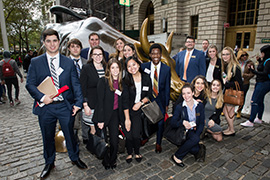
The event’s purpose is twofold: It offers students a glimpse into the working world, and paves the way for them to apply for internships and (eventually) jobs in the companies they visit. At the end of the day, all the participants — students, faculty, staff and alumni — attend a reception, which this year was held at the Club Quarters Hotel in midtown.
“This year’s Career Trek was an even bigger success than the one held last year,” said Joanne Gavin, associate dean for undergraduate programs. “A total of 150 students took part, and 20 different companies hosted them. The reception was awesome; about 60 alumni attended. It was a great day for everyone.”
This was junior Paulo Siracusa’s first Career Trek. “I was in the finance track, and I visited J.P. Morgan and Goldman Sachs,” he said. “I was invited to attend the J.P. Morgan 2018 Wealth Management Summer Analyst Program – Latin America SuperDay,” he said. “This was the last round of interviews for an internship position with their Latin America group.” During the reception, the alumni he met “gave me a lot of advice on preparing for interviews. They told me what behavioral and technical questions I should be expecting to answer, and what classes I should take to be best prepared when starting a job at a bank. I believe that I got to the last stage of the interview process due to the networking experience.”
Meet & Greet/Lunch & Learn
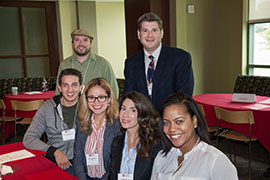
[Grad Event] Participants at the afternoon get-together mingled with classmates and professors, enjoyed a buffet lunch, visited information stations staffed by professionals from various industries, got advice from the “Resume Doctor” (aka Prof. Ken Coletti), and took part in a scavenger hunt for prizes.
Director of IBM Analytics John J. Thomas was the event’s keynote speaker. “Data and analytics play a huge part in how companies do business,” he said. “And a unified approach to data governance and quality management is essential.” Thomas outlined the latest developments in big data collection and analysis, and delineated which data skills are needed to land a position or promotion.
Both current students and alumni had positive impressions of the event. “I’m trying to build my network and look for an internship for next summer, so I thought this would be a good place to start,” said undergraduate Natalie Slawuta ’20. Tom Cantarella, a graduate of the college’s Organizational Leadership and Communications program, completed his MBA last summer. “I try to come to as many alumni events as possible,” he said. “This program was interesting, there was a lot of good information presented.”
“I’m interested in the networking aspect,” said current MBA student Janet Cobb, “as well as meeting with the Resume Doctor. I’m trying to change fields, so I need advice on how to transition. And of course I came to see the professors.”
IN THE PHOTO: Prof. James Melitski (back row on right) visits with event participants
Native Intelligence
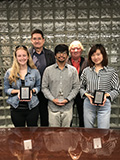
The competition, which took place on October 19-21, brought together undergraduates from colleges throughout the U.S. Each of the teams was tasked with brainstorming the best solution to an international business-related case study within a limited amount of time.
In true David-and-Goliath fashion, the team’s second-place showing was a stellar achievement for several reasons. This was the very first time Marist has fielded a team in an international business competition. All four team members — Madeleine Durand, Prateek Samal, Natasha Cacho, and Yihan Wang — are juniors; most of their competitors were seniors. The team practiced together for just four months. Perhaps most impressive was the fact that the Red Foxes bested squads from several larger institutions with strong international business reputations, including Villanova, George Washington University, and the University of Southern California. Washington State University took top honors in the event.
“In the semifinals, our team was a close second,” said Detelin Elenkov, visiting professor of international business and the team’s faculty adviser. “And in the final round our students made the best presentation from a practical point of view, according to a spokesman for the judges. Most importantly, everybody came to congratulate us for our achievement.”
“Participating in case study competitions such as this one is an invaluable experience for our students,” said Elizabeth Purinton-Johnson, SOM associate professor of marketing and chairperson of the Department of Organization and the Environment, which includes International Business. “They get real-world practice in how to think critically and present their work in a way that’s both persuasive and compelling.”
“The globalization of the economy grows every day,” said Dean Lawrence G. Singleton. “Increasingly, business students need to understand not just how U.S. markets operate, but how economies function in countries and cultures throughout the world.
“We’re excited about and proud of our team’s showing in San Diego. I hope their success will shine a national spotlight on the strength of our business programs here at Marist.”
To learn more about the competition and view a list of participating schools, click here.
IN THE PHOTO: From left, back row: Dean Lawrence Singleton and Prof. Detelin Elenkov. Front row: Teammates Madeleine Durand, Prateek Samal, and Yihan Wang. Not pictured: Team member Natasha Cacho
School of Management hosts start-up challenge
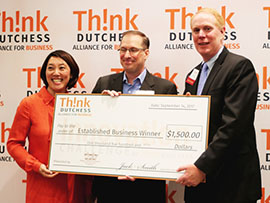
[Think Dutchess] Hosted by the School of Management, the September 14 face-off “is designed to encourage start-ups to plan their enterprises better and to engage with regional support services," said Think Dutchess CEO Sarah Lee. Finalists in two categories — Young Business and Pre-venture Business — pitched their product or service to a panel of judges. When the dust settled, Richard Romano and Danny Gonzalez, respectively, were pronounced the winners. Romano is the creator of Screamin’ Onionz, a fiery condiment made with natural ingredients and no added sugar. Gonzalez is a partner in Facticiti, a Web-based assessment firm that matches a client’s personal interests with job requirements.
“The day that the School of Management hosted the Think Dutchess competition was the same day that the school's IDEA Center was launched,” said Associate Dean James Phillips. “Led by Jay Pantaleo, the school’s director of executive programs, this effort works with students who wish to explore their ideas for opening and running their own businesses.”
Phillips emphasized the importance of cultivating entrepreneurship on the undergraduate level. “According to several CEOs of major corporations, including Wall Street firms, the interest by college students in becoming entrepreneurs is at its highest levels. Here at the School of Management, we believe that the timing for the IDEA Center launch will leverage this interest at Marist and provide students with valuable ‘hands-on’ guidance in this area.”
(Additional information on the IDEA Center will appear in a future issue of this newsletter.)
IN THE PHOTO: Screamin’ Onionz creator Richard Romano (center) receives his prize from Think Dutchess CEO Sarah Lee and event sponsor Jack Smith of William A. Smith & Son Insurance
Alumni Profile: Vito Pagano ’03

Q: Would you briefly describe your business career up to this point?
A: Right out of college, I worked for Pitney Bowes. I achieved 256 percent of my sales goal and won the national Rookie of the Year award. I was then recruited by Bank of America Small Business. I worked in merchant services with businesses that accepted Visa and Mastercard payments; I was a top performer. A year later, I was promoted to vice president of the company’s Global Corporate Investment Bank, where I oversaw businesses that accepted [credit card] payments of $80 million to $2 billion a year and greater. I was one of 16 in the country at that level, and I was just 27 at the time. I was trained on the internal strategies of the bank and learned to recognize the value that a bank brings to a business.
In 2009, Bank of America asked me to sign a three-year non-compete agreement. Fast-forward two years, I’m about to get married, and they wanted to restructure my whole compensation package. I decided to leave and started my own industry. I started the first company in the country that said to companies, “Instead of changing banks and financial institutions, let me create transparency for you. I can validate that what the bank is charging you [for credit-card transactions] is best-in-class pricing, and that there are no erroneous fees in your statement.”
I had no competition, and companies valued our service. After about two years, I developed software that reversed-engineered line item fees on a bank statement, exposing all the miscellaneous surcharges the bank was charging and bringing them to the attention of the merchant. This allowed us to grow. When we were acquired by a private equity group two years ago, we were doing a little better than $22 billion in Visa/Mastercard valuations.
Q: What made you decide to start your own company?
A: When the merchant services division of Bank of America was sold, I saw how the new owners changed compensation packages. They can totally change your whole future in one day. That was a real eye-opener. And because I grew in the bank so quickly, I recognized opportunity in the middle-market sector. Those two factors led me to start my own venture.
Q: That must have been a little frightening.
A: Oh, God. (Laughs.) It was quite the experience, to say the least.
Q: What is the best — and the worst — thing about being an entrepreneur?
A: The fact that every day is new and different. I like having to decide whether I’ll spend the day out in the field doing nonprofit charity work, or cold-calling with my team, or doing a trade show. It keeps work exciting.
The one negative is that you’re working hard all the time. People think, oh you’re the boss, you can do what you want. But the reality is that you work harder than everyone else. Since I sold the company it’s allowed me to reset my life and spend a lot more time with my kids. I have a very blessed life.
Q: Do you have any advice for students who might be thinking of one day starting their own firm?
A: Obviously, you first need to build a professional career. If you have the passion and fire to start your own business, you should go with it. I believe God doesn’t give you a test that you can’t pass. When you face challenges in business, you should look at them as learning experiences. Grit and good faith — that will get you through anything.
Getting to know… Prof. John Finnigan

Finnigan and his wife Karen are the parents of five children who range in age from 29 to 11. “I worked primarily at Dean Witter and Morgan Stanley in the 1990s,” he says. “Initially I worked in operations on the municipal trading desk. By the end I was the CFO of BusinesScape, a small business management subsidiary of Morgan Stanley.” Dealing with work and family obligations was manageable when his office was in downtown Manhattan; after 9/11, however, “I was moved all over the place: first to Jersey City, then to midtown, then the upper east side. My commute changed from half an hour to two and a half hours each way.” During the same period, Karen had gone to medical school and by 2003 had earned her degree and joined a practice. These circumstances — along with the fact that two of their children were not yet in school — spurred him to change course. “It was too much,” he recalls. “The long days were always there, but the commute beats you down. Leaving [his job] wasn’t that difficult. I see my friends now and they say, ‘Don’t you want to come back?’ And I say no, not really. I don’t miss it.”
His teaching career actually began at Dean Witter. “We had an orientation and a ‘Welcome to Wall Street’ class,” he said. “They didn’t have instructors, so I volunteered.” Coming from a long line of teachers — his father, sister and niece all work in the classroom — Finnigan was more than up to the task. “It was natural for me, I had no inhibitions about teaching.” A 2003 meeting at Orange Community College resulted in an adjunct position teaching an entrepreneurship class; soon after, he signed on to teach investment and economics courses at Marist.
To be successful on Wall Street, he tells his students, “You have to look at everything as an opportunity. Once you get your foot in the door, it’s up to you to prove yourself. You need to grasp the concepts, have common sense and self-awareness — and you’ve really got to work hard.
“I give my students extremely difficult tests,” Finnigan admits. “Some will come back and say, ‘I’ve never failed anything before.’ I say it’s a good thing that you’re experiencing it now so you can rebound. Those who bounce back will do well: They faced adversity and weren’t scared by it. That’s a good trait to have in this business.”
Like many of his colleagues, what Finnigan enjoys most about his job is the students themselves. “By and large, they’re really good kids and respectful. They enjoy the fact that they’re getting an honest view from someone who has actually worked in the field.”
Making the Grade
The Marist College MPA program has tied for 51st place on the 2018 list of Best Online Graduate Business Programs published by U.S. News & World Report. The compilation includes all graduate business programs other than MBA, which are listed separately.
The ranking represents a significant uptick in the program’s score, rising 15 spots from its 66th place finish in 2017. Scores are determined by a number of factors, including level of accreditation, faculty credentials and training, student support services, and technology. A multimedia company, U.S. News & World Report has been ranking colleges and their programs since 1983.
Fast Talk
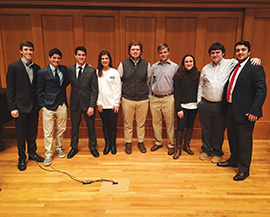
A team made up of first-year students Emily Wells, Dan Defeo and Matthew Hurley took home top honors in the contest. “The winning group pitched a pillow with a built-in alarm, which vibrates to wake up the user,” reports club President Spencer Hogan ’20. “They would most likely market it directly to college students, who are often faced with the issue of being unintentionally awakened by their roommates' alarms. The crowd reacted extremely positively to the idea.” The duo of Steven Ciravolo ’21 and Sam Manowitz ’21 placed second in the contest, while individual competitor Jana Brzovski ’21 was third.
IN THE PHOTO: Elevator Pitch top scorers are congratulated by Business Club President Spencer Hogan ’20 (second from right) and contest judge Daniel Lyons '18
Making Waves
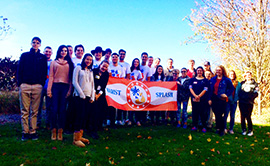
No Horsing Around
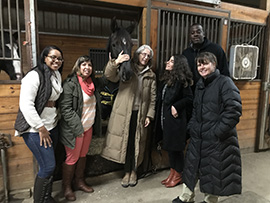
IN THE PHOTO: Prof. Anne Zahradnik (center) introduces her horse, Freetime, to her MPA students
Decisions, decisions
Twenty student teams representing colleges and universities from around the region descended on the Marist campus on November 11 for the 2017 Northeast Regional Ethics Bowl.
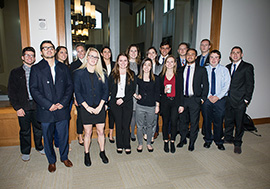
The 12-hour competition “went very well, especially considering we had 20 schools, 26 teams and approximately 250 people,” said Joanne Gavin, associate dean of undergraduate programs and professor of management. A specialist in business ethics, Gavin coaches Marist’s Ethics Bowl contestants. “Teams from Yale, Northeastern, Villanova, Manhattan — as well as two squads from Marist — took part this year,” she said. “Tufts took first place, and West Point came in second.”
Organized nationally by the Association for Practical and Professional Ethics, the regional competition is coordinated by Marist's interdisciplinary Center for Ethics — of which Gavin is a member — and cosponsored by the School of Management and the School of Liberal Arts. This is the second consecutive year that the college has hosted the thought-provoking competition. “With so much positive feedback, the Marist Center for Ethics plans to offer to host [the regional competition] again next year,” Gavin said. “And of course, the SOM will put up another two teams.”
Market Share
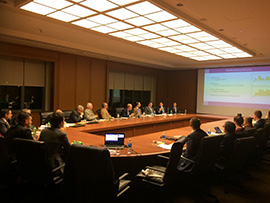
Alumni Profile: Michael D. Johnson ’13, MPA ’17
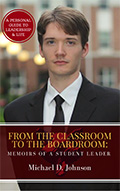
This self-assessment comes as a shock when you take a look at Johnson’s LinkedIn profile. While at Marist, he served as community outreach director for the Student Government Association and was co-director of Marist Up ’Til Dawn, a fundraising initiative benefiting St. Jude Children’s Research Hospital. A lifelong resident of Montville Township, New Jersey, he is currently president of the local chapter of the Kiwanis Club; last month, he completed a three-year term on the town’s board of education. He is the author of the book “From the Classroom to the Boardroom: Memoirs of a Student Leader” and cofounded a website that showcases stories about leadership and civic engagement written by Millennials.
Johnson says his wallflower days came to a screeching halt when he arrived in Poughkeepsie. “When I got to Marist, I realized this was my clean slate,” he says. “I didn’t have to be the shy kid anymore, I could write the story the way I want it to be.” Having some high school experience with community service, he volunteered in student government and found it was “the perfect fit for me. I saw it as a way to advocate for people and bridge perceptions between the student body and the campus administration.” From there, “one door opened after another; before I realized it, I was involved in so many organizations, which led to additional connections and opportunities.”
Johnson earned his B.S. in criminal justice and completed Marist’s paralegal certificate program; currently he works as a paralegal for Dewey, Pegno and Kramarsky in Manhattan. “I came to college with the mindset of becoming an attorney in my hometown,” he says. “But my worldview expanded while at Marist, so my ambitions are a little loftier these days.” When law school began to look less attractive to him, Johnson opted to complete his MPA in public management. “Now I want to pursue an academic or research role in education and criminal justice. What particular shape that’s going to take, I’m still trying to figure out.”
Released on November 1, his self-published book grew out of postgraduate presentations — with friend and classmate Dan Torres — made as part of Marist’s Emerging Leaders Program. “We spoke about our student government experiences and how what we learned connected to our experiences in local government,” he recalls. “We just had so much info to share; we’d get student comments saying, ‘This was great, but I wish there was more time for you to share your stories.’ So I began expanding my notes; once I started, I couldn’t stop. That became my initial manuscript.” Besides illuminating for young people how “the conflicts and questions you encounter as a student leader magnify themselves once you’re out in the real world,” Johnson says the book functions as “a framework about how to handle similar struggles — picking a college, becoming part of a new community, or deciding what to do after high school or college.”
We asked Johnson if he had any advice for current undergrads. “Don’t let anyone else write your story,” he says. “This is your experience to own and control. When you look back on it, you don’t want a story that will knock the socks off someone at your high school reunion, you want your life story to wow you.”
“From the Classroom to the Boardroom: Memoirs of a Student Leader” is available in paperback for $14.99 through Amazon and Barnes & Noble.
Getting to Know… Prof. Thomas Madden
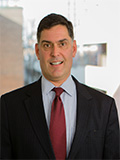
Q: Would you tell us about your career up to this point?
A: My dad was in business, and I started reading contracts when I was about 13 — he’d just toss them to me when he came home with a case full of papers. That piqued my interest in business law, and that was probably why I pursued a law degree. After college, I was interested both in law practice and academic work, and it just took me some time to balance these two interests in one career.
Q: Were you always interested in working in an academic setting?
A: It was something I was considering, having done graduate work after professional school. The academic environment is one that I love. But it was a struggle to meet these multiple interests. Early on, I worked as an adjunct, but with the long-term view toward transitioning to a full-time academic. So I’m really pleased now to have academia be the dominant interest. For so long it was subordinated by the demands of law practice.
Q: Why is this career change taking place now?
A: It was a matter of building experience, as well as feeling that I’d achieved most of what I’d wanted to in my law practice career. I’ve worked in several different environments, from the very largest of firms at Jones Day’s New York office to having my own boutique practice. So I felt that, having had that experience, I could turn my attention more fully to what I’d wanted to do earlier on.
Q: How did you wind up here at Marist?
A: It was just a great opportunity coming at the right time — to have a position at a school that I think is very much on the rise, that offers a great atmosphere and potential for growth.
Q: Why is it important for business students to have knowledge about the law?
A: Increasingly, the competitive advantage of business is intertwined with law and legal concepts. And, together with law, ethical awareness is paramount to me. I try to build an ethics component into my Business Law and Legal Foundations classes; I think ethical awareness is important to have for a successful and rewarding career. It’s particularly poignant in business these days, when we see scandal after scandal hit the news.
Q: What’s one thing you hope your students learn in your class that’s not in the textbook?
A: The importance of critical thinking, and the ability to make and own arguments or analysis and present them to others in a way that’s effective and persuasive.
Q: You’ve only been here since August, but what is your initial impression of Marist?
A: Marist is incredibly welcoming. I felt that when I first visited, and I still feel that now.
Capstone presentations meld research and strategy
Sixteen teams of seniors spent a good part of last semester examining, researching and analyzing six well-known companies — ranging from clothier Ralph Lauren to Campbell Soup — as part of the Business Strategy capstone course.
Drawing on functional areas of management and related field requirements as well as their core studies, the capstone course engages students in developing plans for strategic management. “The course is designed to give seniors the chance to apply the knowledge they have acquired throughout their education to real-world situations,” says SOM Assistant Professor Pamela Harper, who teaches the course. “External, industry, and internal environmental analysis are employed to craft firm strategy and create sustainable competitive advantages in the hypercompetitive global business community.”
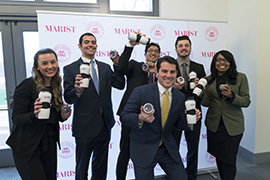
IN THE PHOTO: From left: Capstone presenters Emma Jutrowski, Thomas DeMara, Evangelos Savaides, Matthew J.O’Connor and Thomas Cahill enjoy a lighthearted moment with Prof. Pamela Harper. Becton, Dickinson & Co., a medical technology company, was the subject of the students’ presentation
Reaching new heights
Seniors Eddie Campbell and Maura Sullivan, co-vice-presidents of the Marist chapter of Beta Gamma Sigma, attended that organization’s annual Global Leadership Summit in Lake Buena Vista, Florida, last November.
We asked Sullivan to give us her take on the four-day event:
“At the Global Leadership Summit, we got to meet people studying all facets of business and build our network of connections. We not only listened to inspiring speakers, but we also worked on case studies that exposed us to new topics we could not have experienced in the classroom.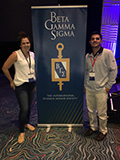
“The focus of the summit was on revolutionary learning; most speakers and workshops concentrated on the idea of enhancing skills in leadership and understanding where you are and where you want to be. In her lecture 'From Here to There,' Dr. Alyssa Preston of Sage LLC encouraged listeners to overcome any adversity that is holding them back and to set goals they want to achieve. I enjoyed the interactive session and got a lot out of what she shared.
“I think the most rewarding aspect of the summit was working with a group of people I had never met before to present a revolutionary topic to a hypothetical board of directors. The ability to work with others and understand your value on a team was a focus of many of the speakers, and I hope I am able to correlate that into my future career.”
Greystone Fund alums meet and mingle in NYC
Stout NYC in Manhattan was the site of the third annual Greystone Dinner, a social and networking event for alumni of the student-managed Greystone Fund class taught by Prof. Brian Haughey. The November 17 event “was a great night,” says Haughey, who notes that attendance has skyrocketed from 14 SOM alumni in 2015 to 35 this past year.
Sean Sullivan ’15 organizes the dinner. “We’re very pleased with the feedback we’ve gotten,” he says. “Most of the attendees are employed either in New York City or the tristate area, but we also have alumni from Connecticut, New Jersey and even Philadelphia make the trip.”
Recent graduates make up the bulk of the participants. “The Greystone program itself gives business students at Marist a huge leg up compared to their business major peers,” says Sullivan. “The point [of the dinner] is to grow the alumni base for [current] students who are trying to break into the financial services industry.”
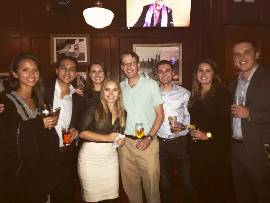
Haughey is justifiably proud of the recent accomplishments of his current Greystone students. “In 2017, the student-managed fund returned 24.5 percent, versus the 21.8 percent return of the S&P 500, which is their benchmark,” he says. “This is a great achievement.”
IN THE PHOTO: From left: Rhianna Ross ’17, John Giuffre ’17 , Samantha Leenas ’17, Carolena Realmuto ’17, Prof. Brian Haughey, Joe Guida ’17, Brianna Lamadore ’17 and Jeff Kortina ’16 at Stout NYC
Beta Alpha Psi chapter to cohost regional meeting
The respective campus chapters of Beta Alpha Psi from Marist College and Old Dominion University in Norfolk, Virginia, will cohost the honor society’s annual Atlantic Coast Regional Meeting in Wilmington, Delaware on March 16-17. beta 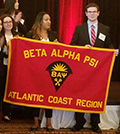
The upcoming meeting will be the first that the Marist chapter, which achieved BAP’s “superior status” ranking last year, has cohosted. Approximately 350 organization members from colleges and universities throughout the region are expected to attend the two-day event, whose theme is “Embracing the Opportunity.” One highlight will be a best practices competition sponsored by the accounting firm Deloitte; in 2017, members of the Marist chapter participated in this annual competition for the first time. Attendees will also be encouraged to prepare homemade greeting cards for sick and traumatized children through the Cardz for Kidz organization.
Since September, chapter President Sydney Williams ’19; VP Frankie D’Angelo ’18; Reporter Hope Brenkert ’19; Treasurer betaAntonino Criscuolo ’18; Secretary Meghan Brennan ’18; New Member Coordinator Emily Ecklund ’20; and Community Service Chair Amanda Young ’20 have been busy lining up speakers, identifying best practices topics and otherwise preparing for the meeting. betabetaThe chapter’s faculty advisers are professors Kenneth Coletti, John Finnigan and J. Donald Warren, Jr. Good luck to all!
Faculty Focus
Professor Brian Haughey hosted several special programs for finance students on Friday afternoons last semester. On Sept. 22, Andrew Crowell of D.A. Davidson lunched with students in the Hancock Board Room and spoke about the wealth management business. On Oct. 2, Prof. Haughey offered advice on how to prepare for Wall Street interviews. Marist alumni Greg Garville ’74 of Brookside Equity Partners discussed private equity on Nov. 3, and Kevin Hogan ’02 of Evercore ISI, both also serve as members of the Dean's Board of Advisors, gave a talk on his work in equity research on Nov. 10. (See our profile below of Hogan, this month’s featured alumnus.)
Professor Melinda Weisberg received two pieces of good news recently. “Training for Success: Persuasive Communication,” her curriculum proposal prepared for Enactus, was accepted for implementation by that international student leadership organization. And the campus chapter of the National Residence Hall Honorary group announced that Weisberg has been named Marist’s “Faculty Member of the Month.” She was nominated by a current student who noted that she “always starts and ends her classes with a smile.”
Prof. Philip A. LaRocco, CPA retires

According to School of Management Dean Lawrence Singleton, "Professor LaRocco has made major contributions to Marist, the School of Management, his students, and the professional accounting community. I have thoroughly enjoyed working with him, and wish him continued success in the future."
“Professor LaRocco provided leadership in the accounting program during his time at Marist,” said J. Donald Warren Jr., professor of accounting and Schlobach Distinguished Chair in Accounting. “His knowledge is exemplified by the range of courses he taught, which included Financial, Intermediate, Advanced, Managerial and Government/Not-for-Profit Accounting; Auditing; and Tax I. He also helped develop the college’s highly successful one-credit Financial Literacy course.”
Well-respected by faculty and students alike, LaRocco received the Student Government School of Management Faculty Member of the Year Award in 2010 and 2013; in 2011 and 2013, he was the recipient of the Excellence in Teaching award presented by the National Society for Leadership and Success. Outside the classroom, LaRocco was a co-advisor for Marist’s Beta Alpha Psi chapter, a service for which he was honored with the Student Government Association’s Faculty Advisor Award in 2015. In addition, he chaired several accounting faculty search committees.
LaRocco received his bachelor’s in business administration (accounting) from Manhattan College and a Master of Science in taxation from William Howard Taft University in Colorado; he is also a certified financial planner and a U.S. Army veteran who served during the Vietnam era.
In his retirement, LaRocco plans to travel with his wife, Linda, and spend more time with his family. We thank him for his valuable service to the college and wish him all the best in his future endeavors.
Alumni Profile: Kevin Hogan '02
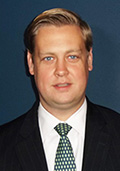
Q: Would you briefly describe your career up to this point?
A: After graduating from Marist, I joined Marsh & McLennan. I worked there for roughly 10 years in insurance brokerage. Around 2010, I joined Evercore ISI. My role is in equity sales. The firm produces investment research to assist clients in their investment decision. Within sales, my job is to articulate our research product on a timely basis to clients.
Q: Since your academic concentration was in marketing, did you find it difficult to transition into sales?
A: Not really. Marist gave me a pretty good education in marketing, and marketing translates on the sales side. More importantly, Marist gave me a well-rounded education that really put an emphasis on working within a group. I learned a lot doing that; it helped with the transition from college into the business world.
Q: Were there any other experiences from your time in Poughkeepsie that you still draw on today?
A: I was the student body president during my senior year, so I was lucky enough to be exposed to the college’s board of trustees and President Dennis Murray. That was invaluable to me: to watch how true professionals, successful men and women, conducted themselves. That was by far the most valuable experience I had.
Q: Last fall, you hosted SOM students in your office during the New York City Career Trek and made a presentation on campus to Prof. Brian Haughey’s students. What were those experiences like?
A: I felt excited to present to the students. It was fun to tell them what my day-to-day work experience is like and describe the highs and lows of a job.
I also found Prof. Haughey’s class incredibly encouraging. The students were clearly prepared and engaged. I presented on a Friday at 3:30 p.m., and we easily went overtime. I was very impressed by them.
It may sound cheesy, but I’m very proud of the fact that I went to Marist. So I’m happy to do anything I can to help prepare students for their future careers.
Getting to know...Prof. Bonnie Stivers
We think it’s fair to say that Bonnie Stivers, Marist’s new professor of accounting, is something of a globe trotter. Born in Los Angeles, she completed her undergraduate degree at Rice University in Houston. Afterwards, with “one suitcase and one friend,” she traveled the world for six months. After returning to the U.S., Stivers married, moved to Atlanta, and embarked on a teaching career that so far has spanned 25 years — five of which were spent in China. She now makes her home in nearby Stone Ridge, next door to her daughter and grandchildren.
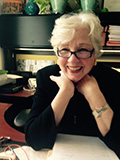
Before coming to Marist, Stivers taught at five U.S. colleges, four of which were in Atlanta; her longest stints were at Kennesaw State University (11 years) and Morehouse College (nine years). The latter is one of the so-called “historically black colleges and universities,” which were established with the express purpose of serving the black community. “I was one of only two white women teaching business at Morehouse. It was quite an experience,” Stivers says. “I knew I was really doing something that made a difference, and the students told me that.”
After her husband’s death, she reluctantly left her position at the college in order to move closer to her children and grandchildren. Last August, she began teaching at Marist. “I teach cost and managerial accounting to undergraduates,” she says. “Managerial accounting is for non-accounting majors, and cost accounting continues the managerial emphasis. It’s accounting information that’s instrumental in business decision-making.”
Her initial impressions of the college are very positive. “It’s very collegial,” she says. “As a brand-newcomer, everybody went the extra step to make me feel welcome.
“I was impressed that students come to class, and they do their homework. I’ve enjoyed my first semester with the students. I just finished grading the cost final, and they’ve done very well.”
